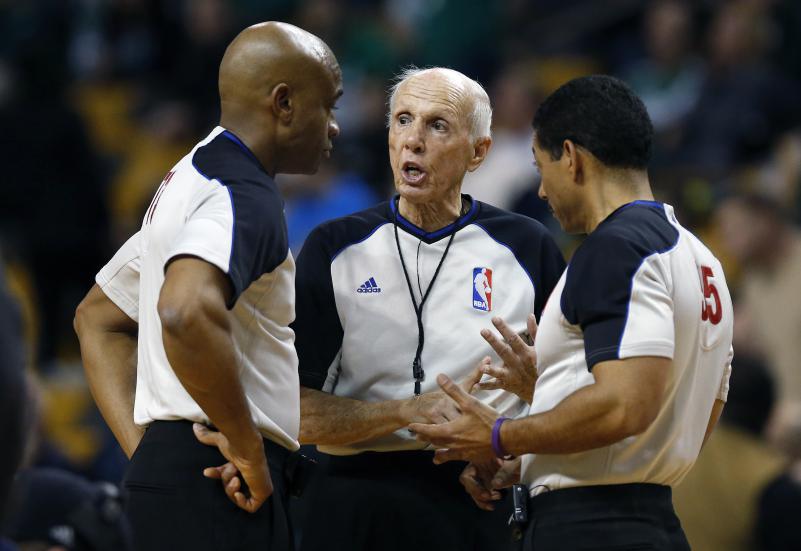
Referees Tre Maddox, left, Dick Bavetta, center, and Bill Kennedy talk during a timeout in the fourth quarter of an NBA basketball game between the Boston Celtics and the Detroit Pistons in Boston, Sunday, March 9, 2014. The Celtics won 118-111. AP
ELIZABETH, N.J. — Imagine if Jack Nicholson’s character kept his cool on the witness stand in “A Few Good Men.”
It wasn’t until he lost it that he admitted ordering the code red, as former NBA referee and current executive Bob Delaney told officials this week.
“I’ve been that guy on the floor,” Delaney said Thursday. “I’ve been the guy that was yelling and screaming, and what does that accomplish? More often than not, you’re out of control.”
From how they act to the ways they officiate, referees were given a number of tips this week during their preseason training camp.
Delaney, who officiated more than 1,500 regular-season games before retiring in 2011, now gives instructions in his second season as the league’s vice president of referee operations. A former New Jersey State Trooper who was diagnosed with Post-Traumatic Stress Disorder after infiltrating the mob during undercover operations in the 1970s, he understands the pressure officials face.
“The maturing of a referee comes when we understand how to interact with the will to win that’s on that floor,” he said. “The will to win on an NBA floor is a tidal wave and it’s not personal affronts. It’s just in the teams’, the fans’, the coaches’, the players’ view, we get in the way of the win. So we’re the ones that make the call, so we get in the way.”
He showed officials three clips this week to make his point: a profane Joe Pesci from “Goodfellas,” Nicholson’s courtroom scene in “A Few Good Men,” and pilot Chesley Sullenberger’s 2009 emergency landing of a US Airways flight on the Hudson River, complete with audio demonstrating how he never lost his poise.
“I mean it was calm, it was collective,” Delaney said. “The point we made to them was, ‘Who do you want to be when you’re flying this game? You want to be like Joe Pesci, you want to be like Jack Nicholson, or you want to be like Capt. Sullenberger? You want to land these games the same way that Capt. Sullenberger did, in a professional manner.'”
The session Thursday went beyond a video and included an emotional visit from Cory Remsburg, a soldier who was critically wounded by a roadside bomb in Afghanistan but still undergoes daily therapy in hopes of returning to service.
“The inspiration that he brings into the room and the never-quit attitude and all the things that we talk about in sports, he just lives. It’s right in front of you,” Delaney said. “So that was the whole concept of today.”
But beyond the life skills that Delaney teaches, there are also performance ones referees need for what is a changing NBA.
Gone are the days when the 3-point shot was used sometimes only in a desperate attempt to catch up. Now teams run plays to get 3-pointers as their first option, so officials have to look further out on the floor than before.
So referees talked about shifting their positioning, allowing for better angles to see plays develop in places they rarely had to look in Delaney’s early years.
“We feel that we needed to make some changes for how we position ourselves and who’s responsible for what as we move and rotate,” executive vice president of operations Mike Bantom said. “But even better, I think, was we’ve taken it from what was traditionally written in a manual and put it on a video so that all these guys now have the video mechanics.”
The staff, featuring recently retired refs Bennett Salvatore, Eddie F. Rush and Joe Forte in development and advisory roles, will help officials prepare to make those tough calls. So will arriving early at the arena to get focused, trusting their teammates, and other things Delaney urges.
“When you go into your office, you’re comfortable,” Delaney said. “When they walk into that office — some people call it an arena, it’s our office — we’re comfortable. That’s our normal environment.”

